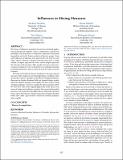Influences in Mixing Measures
Author(s)
Koehler, Frederic; Lifshitz, Noam; Minzer, Dor; Mossel, Elchanan
Download3618260.3649731.pdf (686.6Kb)
Publisher Policy
Publisher Policy
Article is made available in accordance with the publisher's policy and may be subject to US copyright law. Please refer to the publisher's site for terms of use.
Terms of use
Metadata
Show full item recordAbstract
The theory of influences in product measures has profound applications in theoretical computer science, combinatorics, and discrete probability. This deep theory is intimately connected to functional inequalities and to the Fourier analysis of discrete groups. Originally, influences of functions were motivated by the study of social choice theory, wherein a Boolean function represents a voting scheme, its inputs represent the votes, and its output represents the outcome of the elections. Thus, product measures represent a scenario in which the votes of the parties are randomly and independently distributed, which is often far from the truth in real-life scenarios. We begin to develop the theory of influences for more general measures under mixing or spectral independence conditions. More specifically, we prove analogues of the KKL and Talagrand influence theorems for Markov Random Fields on bounded degree graphs when the Glauber dynamics mix rapidly. We thus resolve a long standing challenge, stated for example by Kalai and Safra (2005). We show how some of the original applications of the theory of in terms of voting and coalitions extend to these general dependent measures. Our results thus shed light both on voting with correlated voters and on the behavior of general functions of Markov Random Fields (also called "spin-systems") where the Glauber dynamics mixes rapidly.
Description
STOC ’24, June 24–28, 2024, Vancouver, BC, Canada
Date issued
2024-06-10Department
Massachusetts Institute of Technology. Department of MathematicsPublisher
ACM
Citation
Koehler, Frederic, Lifshitz, Noam, Minzer, Dor and Mossel, Elchanan. 2024. "Influences in Mixing Measures."
Version: Final published version
ISBN
979-8-4007-0383-6